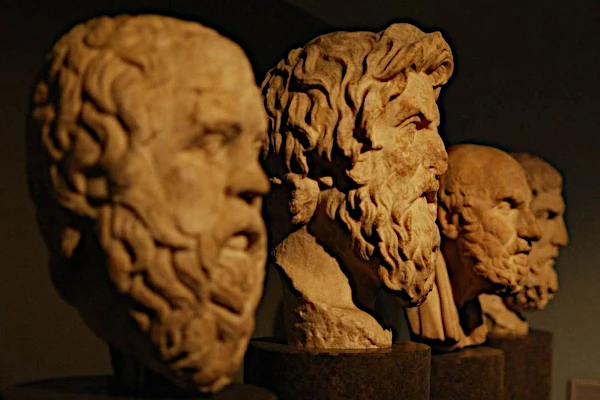
Ancient Greece produced a multitude of thinkers whose ideas continue to influence modern philosophy, science, and culture. From Socrates to Aristotle, these philosophers left a lasting legacy through their writings, which have endured through the ages.
Thales of Miletus (624-546 BC) is often considered the first philosopher of ancient Greece. He is known for his theories on water as the fundamental principle of all things and for his contributions to geometry and astronomy.
Pythagoras (570-495 BC) is famous for his doctrine of numbers and his theorem in geometry. He believed that numbers were the basis of all reality and that musical harmony could be explained by numerical ratios.
Heraclitus (535-475 BC) is known for his doctrine of perpetual flux, often summarized by the phrase "You never step into the same river twice." He argued that change is the only constant in the universe.
Anaxagoras (500-428 BC) proposed that all things are composed of tiny particles called homoeomeries. He also advanced the idea that the mind (nous) is the driving force of the universe.
Empedocles (490-430 BC) proposed that all things are composed of four fundamental elements: earth, air, fire, and water. He also introduced the concepts of love and strife as the driving forces of change.
Democritus (460-370 BC) is famous for his theory of atomism, which posits that all matter is composed of indivisible and indestructible atoms. This idea has had a lasting influence on modern science.
Socrates (469-399 BC) left no writings of his own. Most of what we know about his ideas and teachings comes from his students, particularly Plato and Xenophon, who documented his dialogues and reflections. The Socratic method, based on dialectical questioning, is a teaching method that seeks to encourage critical thinking. In Plato's dialogues, such as "Apology," we discover how Socrates encouraged his interlocutors to examine their beliefs.
Plato (427-347 BC) wrote many philosophical dialogues, which have become essential references in the study of philosophy. Works such as "The Republic," which explores justice and the best form of government, and "The Symposium," which addresses the theme of love, continue to be studied and debated.
Diogenes of Sinope (412-323 BC) is known for his ascetic lifestyle and cynical teachings, which emphasize simplicity and virtue. Although a contemporary of Plato and Aristotle, his ideas continue to influence modern philosophy.
Aristotle (384-322 BC), a student of Plato, wrote on a multitude of subjects ranging from metaphysics to ethics. His works, such as "Nicomachean Ethics" and "Politics," are fundamental to understanding ethical and political concepts. Additionally, Aristotle is often considered the father of logic, with his "Organon," which laid the foundations of logical thinking.
Epicurus (341-270 BC) founded a school that advocated the pursuit of pleasure and the avoidance of pain as fundamental principles of a happy life. His writings, such as the "Letter to Menoeceus," detail his philosophy of life and continue to inspire contemporary movements on happiness and well-being.
Zeno of Citium (334-262 BC) is the founder of Stoicism, a school of philosophy that advocates virtue, reason, and the control of emotions. Stoicism has had a lasting influence on Western philosophy.
Chrysippus (279-206 BC) is often considered the second founder of Stoicism. His writings systematized and developed Stoic doctrines, making him a central figure in this philosophical school.
Epictetus (55-135 AD) is a Stoic philosopher whose teachings were compiled by his student Arrian in the "Discourses" and the "Enchiridion." Epictetus emphasized self-control and the acceptance of what is beyond our control.
The philosophers of ancient Greece laid the foundations of Western thought, their writings and teachings continuing to illuminate today's philosophical, scientific, and political debates. Their legacy invites us to always question, explore, and understand the world around us with renewed intellectual curiosity and rigor.